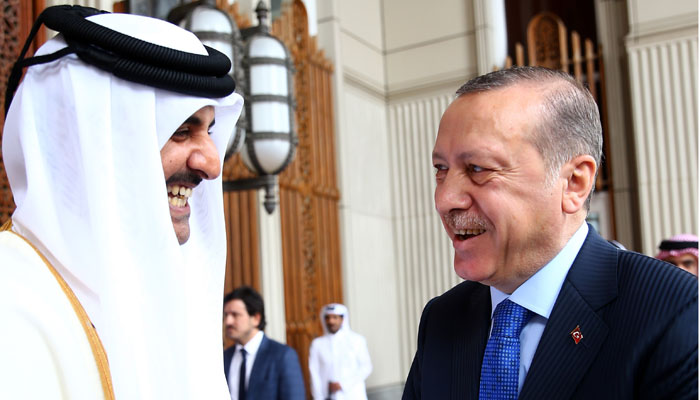A new technical arrangement between Turkey and Qatar deepens military cooperation between the two nations, allowing Doha to use Turkish airbases and airspace, giving Qatari aircraft a “Permanent Diplomatic Flight Clearance” and authorization to transport and air-drop Turkish military equipment, ammunition and personnel.
Turkish and Qatari officials signed the technical arrangement, based on a military cooperation agreement between the two governments signed in 2007, on March 2. The Turkish parliament ratified the accord on June 15.
The technical arrangement aims to regulate “the temporary deployment, stationing and use of Qatari military aircraft, personnel and equipment.”
According to the document published by the Turkish parliament, Turkey is set to train Qatari fighter pilots and will allow the temporary deployment of up to 36 Qatari military aircraft and 250 personnel.
The term of the agreement is five years and will be extended automatically for one-year periods unless either party requests a withdrawal from the agreement.
Critics have long condemned Turkish President Recep Tayyip Erdoğan’s relations with the ideologically aligned Qatari Emir Tamim bin Hamad Al Thani.
Qatar and Turkey have enjoyed close relations, particularly since a diplomatic crisis with the Gulf country erupted on June 5, 2017. The Arab quartet, led by the UAE and Saudi Arabia, accused Qatar of links to the Muslim Brotherhood along with several other militant Islamist groups in the region.
Qatar was supportive of the Arab Spring, which first erupted in 2011 in Tunisia, with a view to ousting established regimes in Arab countries. Since then, Turkey has backed Qatar and increased its number of troops in the Gulf country.
In a column for the TR724 news website published on Tuesday, Turkish journalist Adem Yavuz Arslan noted the extent of the accord and vagueness of the terms of deployment and pointed out that the implementation could be used by Erdoğan to facilitate extralegal and illegal activities as several allegations implicate his administration in international drug-trafficking and arms-smuggling schemes.
According to Arslan, the use of Qatari aircraft to transport goods could allow Erdoğan to avoid deploying the Turkish military, the army of a NATO member country, for such schemes.
According to a report by journalist Levent Kenez published in Nordic Monitor on June 22, several problems would arise in the implementation of the new agreement.
If Qatari pilots are to receive training on Turkish jets, for example on US-made F-16s, US permission must be secured, the report notes and adds that in 2017, the US rejected a Turkish proposal to use Pakistani pilots for training Turkish pilots in F-16 fighter jets following the government’s purge of 680 of 1,350 pilots from the Turkish Air Forces after a coup attempt in 2016.
According to the report, the Qatar Air Force may also require permission for Turkish pilots to fly on French-made aircraft since one Turkish pilot must be present in the aircraft according to the agreement.
The Qatar Air Force currently has a fleet of French-made Mirage 2000 and Rafale aircraft, and it has also ordered 36 F-15Es from the US, in line with which Qatar signed a $68 million contract with Boeing for the training of its pilots in the United States starting from 2021.
According to Arslan, the agreement also might indicate Turkey’s shortage of air force pilots and aircraft, stating that in the event of a Turkish request, Qatari aircraft will be provided for the transportation of military equipment and personnel.
Since 2015, Turkish troops have been active at the Tariq bin Ziyad military base outside Doha and have expanded their presence there over the years. With around 3,000 troops in Qatar led by the Qatar-Turkey Combined Joint Force Command, the base was previously described by the Arab quartet as a “source of instability.”
Through a presidential decree in December 2018, President Erdoğan transferred the right to operate Turkey’s national tank factory for 25 years to Turkish-Qatari vehicle manufacturer BMC. It was the first time that a military facility of strategic importance had been privatized.
At a joint meeting in November 2020 in Ankara, the two countries signed 10 deals whereby the Qatar Investment Authority bought a 10 percent stake in the main stock exchange of Turkey. This came in addition to a $15 billion swap agreement between Turkey and Qatar.
On June 21, Turkey began organizing its annual Anatolian Eagle Air Force Exercise in Konya with the participation of Azerbaijani, Pakistani, Qatari and NATO elements.
Qatar and Turkey are party to at least 62 agreements that cover numerous sectors, including economy, military, safety, investment, energy, culture, intellectual property, education and youth.
According to a report released by the Stockholm International Peace Research Institute, Qatar’s arms imports saw a 361 percent increase between 2016 and 2020.


